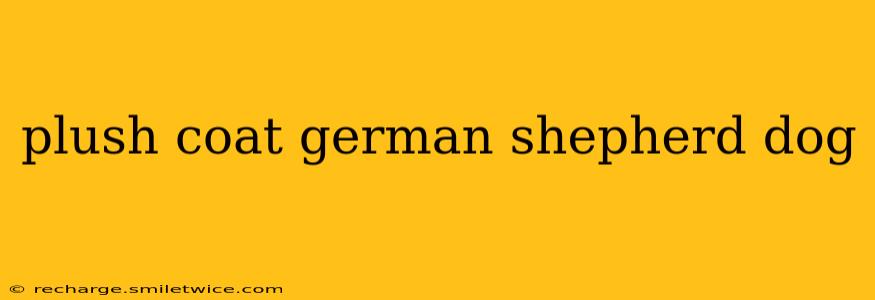The German Shepherd Dog, renowned for its intelligence, loyalty, and striking appearance, comes in a variety of coat types. Among them, the plush coat German Shepherd stands out with its uniquely soft and dense fur. This guide delves into the characteristics, care requirements, and potential health concerns associated with this captivating variation of the breed.
What is a Plush Coat German Shepherd?
A plush coat German Shepherd possesses a double coat, like all German Shepherds, but the undercoat is significantly denser and softer than in other German Shepherds. This results in a coat that feels incredibly plush to the touch, almost like velvet. The outer coat remains relatively short, contributing to the overall soft and cuddly texture. While not officially recognized as a separate breed standard, the plush coat is a naturally occurring variation within the breed.
How to Identify a Plush Coat German Shepherd?
Identifying a plush coat German Shepherd requires careful observation. Look for a coat that is:
- Dense and Soft: The most noticeable characteristic is the incredibly soft and dense undercoat. It feels significantly plusher than a standard German Shepherd's coat.
- Short to Medium Length: The outer coat is generally shorter to medium in length, not the long, flowing coat sometimes seen in other variations.
- Even Texture: The coat should feel even across the body, without significant patches of different textures.
Remember, a plush coat is a variation, not a defect. A healthy plush-coated German Shepherd will still exhibit all the other characteristics of a well-bred German Shepherd.
Are Plush Coat German Shepherds More Prone to Health Issues?
Are Plush Coat German Shepherds Healthier Than Other Coats?
There's no scientific evidence suggesting plush-coated German Shepherds are inherently healthier or less healthy than those with other coat types. The health of a German Shepherd is primarily determined by genetics and responsible breeding practices. However, the denser coat can potentially trap more moisture and debris, so diligent grooming is crucial.
What Health Problems are Common in German Shepherds (Regardless of Coat Type)?
German Shepherds, regardless of coat type, are prone to certain health issues, including hip and elbow dysplasia, degenerative myelopathy, and bloat. Responsible breeders screen their dogs for these conditions to minimize the risk in their offspring. Choosing a reputable breeder is paramount when acquiring a German Shepherd puppy, regardless of the desired coat type.
Grooming a Plush Coat German Shepherd
The plush coat requires more frequent grooming than a standard German Shepherd coat. Regular brushing, ideally several times a week, is necessary to prevent matting and tangles. This also helps remove dead hair and distribute natural oils, maintaining the coat's health and shine.
How Much Does a Plush Coat German Shepherd Cost?
The cost of a German Shepherd puppy, regardless of coat type, varies greatly depending on several factors including the breeder's reputation, the dog's lineage, and the location. Plush coat German Shepherds are not necessarily more or less expensive than other coat variations. Expect to pay a significant amount for a puppy from a reputable breeder, as responsible breeding practices require substantial investment.
Finding a Reputable Breeder for a Plush Coat German Shepherd
Finding a responsible breeder is crucial, regardless of the coat type you desire. Reputable breeders prioritize the health and temperament of their dogs, conducting health screenings and ensuring appropriate socialization. Research breeders thoroughly, asking questions about their breeding practices, the health history of their dogs, and their willingness to provide ongoing support after you acquire a puppy.
This comprehensive guide offers a detailed look at the plush coat German Shepherd. Remember, responsible ownership includes providing proper care, nutrition, and veterinary attention to ensure your furry companion enjoys a long and healthy life.
